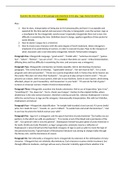Examine the view that, in this passage and elsewhere in the play, ‘Iago shows himself to be a
misogynist’.
Plan:
1- How he does, interpretation of being due to his homosexuality and how it is acceptable and
expected for the time period and everyone in the play is misogynistic, even the women, Iago as
a mouthpiece for his misogynistic society (wasn’t especially misogynistic then, but is now, the
difficulty in examining the view. Definition doesn’t change, applies regardless of time period or
social climate.
2- How he doesn’t (argue he is a feminist)
3- How he treats every character with the same degree of harsh treatment, where misogyny is
employed in his undermining of women, in order to execute his plan. Plays to the misogyny of
other characters and is not inherantly misogynistic himself. Performative misogyny.
Paragraph One- Misogynistic Language- “good wench”, “foolish wife”, “notorious strumpet!”, “guinea
hen”, “whore”, “fitchew”, “you are a fool”, “it is a creature that dotes on cassio”. Critical interpretation,
differing time and thus difficulty in examining the view, and everyone was a misogynist.
Paragraph Two- Misogynistic commentary on female sexuality- link to slut shaming of previous
paragraph. “This is the fruits of whoring”, “supersubtle venician”, “her eye must be fed”, “it is a most
pregnant and unforced position”, “I know our country disposition well; In Venice they do let heaven see
the pranks They dare not show their husbands”, “you get up to play and go to bed to work”, “You are
pictures out a-doors, bells in your parlors, wild-cats in your kitchens, Saints in your injuries, devils being
offended, players in your housewifery, and housewives’ in your beds”, “I’ll warrant her full of game”.
Context on Venecian women. Modern Feminist interpretation.
Paragraph Three- Misogynistic assertion into female submission- link to use of imperatives “give it me”,
“[snatching it]”, “Go, leave me”, “Go to, charm your tongue”. Contary to the original Cinthio, where
desdemona is the only named character, therefore centring around her, whereas Shakespeare’s version
shifts the central focus to Iago and his misogyny. Homosexuality interpretation, film with Ian McKellan,
shakespeare as bisexual.
Paragraph Four - Misogynistic objectification- “he tonight hath boarded a land carrack. If it prove lawful
prize, he’s made for ever”, “zounds, sir, you’re robbed”, “to suckle fools and small chronical beer”, “and
to see how he prizes the foolish woman your wife!”
Paragraph Five - Iago isn’t a misogynist, and his speech has hints of proto-feminism “Our bodies are our
gardens, to the which our wills are gardeners”, “It is merely a lust of the blood and a permission of the
will”, “Our general’s wife is now the general”. Shakespeare himself has given glints of proto-feminism in
his works (Emilia and Lady Macbeth), so Iago’s progressive comments may be a reflection of
Shakespeare’s views himself and the hyperbolic misogyny of Iago is used as satire to mock the logic of
the patriarchal society. Typical feature of Renaissance literature was aiming to change reality through
the literary arts, and the dominance of reason.
Paragraph Six- Not inherantly a misogynist, but is misogynistic by extension of his victimisation of every
character. Misogynist but not relatively discriminatory. Each character receives similar treatment, but
through different mediums, and Iago will use every character’s identity against them whether it be





